- Home
- Muriel Spark
Aiding and Abetting Page 2
Aiding and Abetting Read online
Page 2
“His body was never found,” said Walker. “Naturally. Because I am Lucan.”
“You are not the only claimant,” she said.
“Really? Who is the other?”
“There could be many others. Several, at least. At what scope or advantage I can’t imagine. I should have thought you’d want to keep it quiet.”
“I am keeping it quiet,” said Walker. “My secret is safe with you.”
“Are you sure?”
“Yes, I’m sure.”
“I have only to ring Interpol.”
“So have I.”
“To give yourself up?” she said.
“No, to give you up, Dr. Wolf.”
“Me? What do you mean?” Her voice had changed as if she had difficulty swallowing, as if her mouth was dry.
“You are Beate Pappenheim, the fake stigmatic from Bavaria who was exposed in 1986, who disappeared with so many millions of marks from the Pappenheim Catholic Fund that nobody knew how many, who—”
“What you are saying,” she said, “means nothing to me. Let’s return to your problem, which, as I see it, is one of identity.”
“I know who I am,” he said. “I have friends. Helpers. People who know who I am.”
“Perhaps, then, you don’t need me,” she said, arranging the pens on her desk a little more neatly than they had been.
“Beate Pappenheim,” he said, “how long does a warrant for arrest last? A whole lifetime?”
“My name is not Pappenheim,” she said, “and I am not a lawyer. I imagine a warrant for arrest in most countries lasts a lifetime or until the event of an arrest being made, but surely among your friends and helpers there is one who knows or practices criminal law?”
“My friends are getting old and some have died,” said Walker the so-called Lucan. “None of them has practiced the law. They are gentlemen, they are millionaires, but not lawyers.”
“You come here,” said Dr. Wolf, “with your story of being Robert Walker alias the seventh Earl of Lucan, a fugitive from British law, wanted for murder. What proof can you offer that any of this story is true?”
“I don’t need to prove anything.”
“If you wish to continue as my patient you do,” she said. “Especially since I have another patient, Lucan, who claims that he did do the murder; in fact, is almost proud of it.”
“Dr. Pappenheim . . .”
“Mr. Walker, it’s money you want, isn’t it?”
“Partly.”
“Bring me proof that you are Lucan and I’ll pay you, partly. And now your time is up, for which you pay me. You pay at the desk and no fooling.”
“Next Friday, Dr. Pappenheim?”
“Get out.” She glared at him but he smiled at her as he rose, suave, casually dressed, rich, manicured, simply awful.
Hildegard took out of her handbag a small scent-spray which she puffed on either side of her neck. She put the spray back in her bag, thinking, I’m an animal trying to put that man off the scent. Where did he come from, that muckraker? She phoned Jean-Pierre, knowing confidently of his admiration for her methods and his respect for her fame. “Yes, I am being threatened,” she said, “about some past life of mine, something in another world. It’s upsetting me. Not rationally, of course. But I don’t know quite what to do.”
“We can discuss it tonight, Hildegard. Why are you upset? Don’t you expect your patients to be nuts?”
“It’s that first Lord Lucan, Walker by name. Who do you suppose Walker really is?”
“A private detective,” said Jean-Pierre. “Someone making enquiries about the real Lucan, it could be.”
“See you later,” she said.
Jean-Pierre was seven years her junior. Their difference in age was not apparent. Hildegard had a charming face and form, with dark well-cared-for hair, a pale skin and large gray eyes. Jean-Pierre was a man of big build, already grisly-gray with a beard. For over five years now he had shared his life with Hildegard. He could think of no one else, practically nothing else, but Hildegard.
Jean-Pierre was a metal- and wood-worker, with a workshop and foundry where he spent his working days. Jean-Pierre had a genius for making things, such as bells, fire irons, horse brasses, doors, windows, and especially adjustable bookcases. He also restored objects which had been broken; he made lamps out of vases and mended good china jugs. His workshop was like a junk heap of Europe, a history of antiquity, with its corner cabinets and consoles filled and littered with little boxes, primitive telephones, shells, ancient coins, everything. He used coins for eyes, frequently, when he felt in the mood to make up a mask in wood and iron. He liked wooden shoe-forms. This place or business was in the suburbs, by road (he had a Fiat van) half an hour from the center outside of the rush hour. He now lived with Hildegard in the rue du Dragon on the Left Bank.
4
Do not lose hold of the name Hildegard Wolf. Her real name, Beate Pappenheim, now comes into this story, but she leads us inevitably to Hildegard. Beate was a young student in Munich in the seventies when she suddenly got tired, very, very tired, of being poor. This happens to a great number of impoverished people. Not all can do something about that condition.
Beate, a medical student who hoped to specialize in feminist psychology, was having a very hard time. She attended her university classes in the mornings and early afternoon she studied English. But from 4 P.M. to 8 P.M. she had to work a four-hour shift in the handbag department of a department store. It was the only way she could make a living, earning enough to pay for her cheap bedsitting room and meager food. Her parents lived in the country on a pig farm. She went to see them by bus one weekend a month, taking with her an offering of tinned foods, oatmeal or pickled cucumber. Her studies fascinated her. The job at the handbag department of the store wearied her heart out. She was tired of women who came to buy handbags and who tried the capacity of their purchases by first emptying their own bags to see if the contents would fit into the new one. It was then that Beate Pappenheim would frequently catch sight of the fat, bulging notecases of some of these women. Sometimes the money, solid packets of deutshe marks, was not even enclosed in a wallet. Beate coveted this money. She would have stolen had she been able to do so without detection. She was tired, tired. Still in her twenties, she felt worn out. Her need for money was continual. Her boyfriend was a theological student, of the Protestant faith. He spoke English fluently, made her speak to him in English so that she could read the English-language textbooks in psychology. He would have loved to be a Catholic, the churches were so much more cheerful than any others, so full of color and glitter, incense and images.
One day on a Saturday when she was not visiting the farm, her boyfriend, Heinrich, came to visit her. It was three in the afternoon. He had a key. He found her on the bed covered in blood. She was having a menstrual hemorrhage. Blood all over the sheets, the floor, her hands. Heinrich ran for the landlady, who screamed when she saw Beate. Meanwhile the young man located a doctor who came and gave Beate an injection and the landlady orders to clean up the mess. Heinrich took over the job from the trembling woman who was also concerned about her bed sheets and the curtains, for blood had even spread to the windows, somehow.
Much later Beate was able to sit up. The landlady, to Beate’s surprise, was now sympathetic and brought her some soup which Heinrich heated up on the spirit stove in the corner of the room. “You reminded me,” said the landlady, who was a Catholic, “of a picture I saw as a child of Sister Anastasia of the Five Wounds. She was a stigmatic. She worked miracles, so they said. But the Church never recognized her as a saint. When the Bishop came to visit the churches in the diocese we had to run and put the picture out of sight. But we often had a collection for Sister Anastasia. She was good to the poor.”
This was how Beate got her idea of being a holy stigmatic. She changed her address. Every monthly menstrual cycle she covered herself in blood and bandaged her hands so that blood appeared to seep through. She was stricken every month, as
the phenomenon is traditionally represented, with at least one of the five wounds of Christ (a nail wound on each hand and foot, and a sword wound in the side). In between the cycles she wrote out testimonies to her healing powers, aided and abetted by Heinrich who appeared so much to believe in Beate’s claims that possibly, on interrogation, it would have emerged that he truly believed them. The nature of belief is very strange.
Beate had arranged for thousands of leaflets to be printed:
BLESSED BEATE PAPPENHEIM
THE STIGMATIC OF MUNICH
Please repeat the following prayer seven mornings a week for seven weeks. Beate Pappenheim prays and suffers for you.
O Lord, bless us through the good offices of our sister Beate Pappenheim. We Beseech Thee to hear her prayer on behalf of our sick/suffering brother/sister [delete as appropriate] N. In the name of the Five Wounds of Jesus Christ Our Lord.
Underneath was a picture of Beate holding up her blood-stained hands.
Below this was printed a brief biography of Beate with emphasis on her churchgoing insistence from childhood upwards.
The pamphlet concluded:
I enclose the sum of ......... for the aid of Beate Pappenheim’s Poor. Please send what you can afford. No gift is too small.
Heinrich had some friends in the theological college on whom he tried this pamphlet. “She really works miracles.” Nearly all of them laughed it off. But not all. After a while the news of Beate’s miracle-working reached the nursing profession and somehow or other got to the shores of Ireland, the great land of believers. There it exploded into a real cult, so that when eventually (it took eight years) she was exposed as a fraud by analysis of her menstrual blood, more money in Irish currency than any other was found to have been placed in her account. Meanwhile, she had escaped, disappeared.
Beate during that time had been able to live in comfort. Every month she took to her bed and bloodily received pilgrims. Miracles did happen, as in fact they sometimes do. When she was finally exposed, a great number of her followers, mainly poor people, refused to believe what the newspapers reported.
Beate herself fled abroad. She changed her name to Hildegard Wolf. She moved, later, to Paris and set up as a psychiatrist there. With her change of name her personality expanded; it changed considerably. She would have sworn that the Beate Pappenheim of her past was a “different person” from herself; but she had never for the past twelve years been obliged to consider the question. She had just put Beate out of her mind, destroying her old birth certificate and replacing it with a new one obtained from a lawyer in Marseilles.
She had not been forgotten altogether by the acquaintances, the friends, enemies and hangers-on of her old life, those who had profited by the cult of Blessed Beate Pappenheim. And many a poor and aging Catholic devotee of France and the British Isles remembered her name, remembered the sacrifices of their youth—the small sums, to them large, sent to Germany each month in the form of postal orders, or simple ten-shilling notes put into an envelope with a prayerful letter. Because they had sent the money they mostly continued to believe in her, long after the Catholic Herald and The Tablet, for instance, have published reports of Beate’s scientifically proved fraud. “Beate, you have got to be true. I believe in you because I sent you all my savings and I prayed your Novena” were the words of one typical letter subsequently Returned to Sender, Address Unknown. Heinrich returned to his theological college keeping quiet.
Walker, the first so-called Lord Lucan, arrived in time for his next appointment, and was shown in. He sat down and lit a cigarette without permission.
“Put it out,” she said.
“I like a cigarette after lunch.”
“But I haven’t had my lunch,” said Hildegard firmly. “I am just about to send down to the brasserie for a sandwich.” She buzzed her secretary. “Have them send up a ham-and-cheese sandwich and a quarter bottle of red wine,” she ordered.
“To get down to the question of your identity . . .” Walker began. But Hildegard was defiant. “If you have come here for a consultation that is what you’ll get. On the question of sandwiches, sooner or later we all have to stop for a sandwich or grab a sandwich before the theater. I always have a sandwich sent up on days like today when one is expecting a boring patient, very boring. Neither in anticipation, nor retrospect, can one’s digestion cope with a full meal. It is best to faire monter a sandwich. How old are you?”
“Sixty-five next December.”
“You look older.”
“I’ve had a rough time. I’ve been on the run. Let me explain—”
“When I’ve had my sandwich.” Hildegard kept silent till the girl had arrived bearing a tray. She started to eat. Between mouthfuls she spoke on, but every time she took a bite he tried to speak, too. It was quite a battle, and Hildegard won it. “Sandwiches,” she said, “like diamonds, are forever. Children love them. They are the most useful, yet often the most despised of foods.” She was carried away by fantasy. “My fondest memories from childhood are connected with sandwiches. At children’s parties—”
“The most secure way of keeping my identity private is not to reveal it. But if I do have to make it known that I am Lucan, as in the case of consulting a psychiatrist as you see I have decided to do,” he said, “the only secure way is to know something secret about the psychiatrist equal in criminality to my own case.”
“Murder would be difficult to equal,” she said. “The sandwich was first invented by the fourth Earl of Sandwich in the eighteenth century who was a gambler like yourself, if in fact you are Lord Lucan. He devised this means of nourishment at odd hours without the necessity of leaving the gaming table for his meals, Mr. Walker.”
“But you are still wanted for fraud,” said Mr. Walker, “of a particularly disreputable kind. How many poor housemaids did you rob of their savings when you were Beate Pappenheim?”
“Where you come from, of course,” said Hildegard, “the sandwiches are spread with butter. Sandwiches of the British Isles differ greatly from German sandwiches.” She poured herself a glass of wine from the small bottle on the tray. There remained another sandwich which she lifted and slowly contemplated, then carefully took a nibble of. “German sandwiches are much thicker, with some sort of pickles and sausage or cheese inside. Your English sandwiches, on the other hand, are cut thin, thin. They are buttered. They have fillings like chopped egg and tomatoes, sprinkled with cress which hangs in tiny threads, temptingly, out of the sides. They—”
“I know, I know,” said Walker. “I remember them at the school sports occasions. What I have come here to discuss is the situation, which is, what are you going to do about it? I refer to the situation I described at our last sitting.”
“Oh, you are growing a beard,” Hildegard said, “and besides,” she said as she sipped and daintily chewed at her leisure, “there are shrimps, there are lobster and salmon, which make ideal sandwich fillings. Strawberry sandwiches are great for picnics.
“There was a time,” she continued before Mr. Walker could interrupt again, “when bakers would sell a sandwich loaf already sliced, either white, brown or wholemeal. Probably there remain some bakers who do this. Now, I’m sure that while you sit there you find yourself eagerly desiring one of these delicious sandwiches. Don’t they fill you with English nostalgia?” She wiped the corners of her mouth delicately with the pink paper napkin provided by the brasserie, and looked at her watch.
“Goodness—the time!” she said. “I’m afraid we have to make it an abbreviated session today as I have a most urgent engagement outside the office with a patient too sick to visit me. I must visit her. Please make another appointment at the desk, if you wish to continue. Next Friday?”
“No,” he said.
“Very well,” she said. “Good-bye.”
“You’ll be hearing from me,” said Mr. Walker alias Lord Lucan. “I’ll be in touch, Fraulein Pappenheim.”
She had pressed the bell on her desk. The petite receptioni
st appeared at the door.
“The patient wishes to make another appointment,” said Hildegard. She added in a more confiding tone, “The usual fee.”
5
From all accounts and police records of the affair of the seventh Earl of Lucan he was an extremely arrogant person. Arrogance is incurable. It usually arises from a deep (sometimes justified) sense of inferiority. Another feature of this Earl of Lucan, which supposedly he maintained, was a peculiar eating habit which lasted apparently the whole of his adult life up to his disappearance. And beyond? He ate nothing but smoked salmon and lamb chops every day; in winter the chops were grilled, in summer they were served en gelée. Dull people found him amusing. Interesting people thought him desperately dull. His wife was not very popular with Lucan’s gambling set. Lady Lucan was unimaginative but honest. She protected her children, and in a bitter court case with Lucan she had won custody of them.
Jean-Pierre had studied the huge pile of press cuttings which Hildegard had obtained from London. He said to her, “The two Lucans are in league, you may be sure of that, if one of them is trying in some way to blackmail you. Myself, I think it unlikely that two men should turn up at your studio at the same time, both claiming to be Lucans.”
“I think the second may be the genuine man,” said Hildegard, “the first a friend of his, a helper, making sure I don’t turn the genuine Lucan over to the police.”
“I am not sure of that,” he said.
“Nor am I. Perhaps neither man is Lucan.”
“Beate Pappenheim. Was it really your name?”
“Yes.”
“Beate Pappenheim . . . how lovely.”
“Why,” said Jean-Pierre the following evening, “did you not tell me before about your exciting early life as a stigmatic?”
“Listen,” she said, “I caused miracles. I really did cure some people. Strangely enough, I did.”

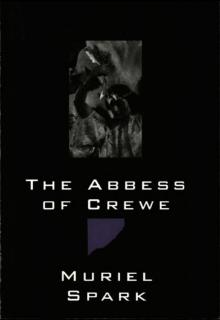 The Abbess of Crewe: A Modern Morality Tale
The Abbess of Crewe: A Modern Morality Tale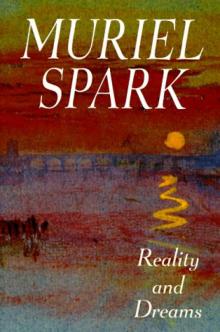 Reality and Dreams
Reality and Dreams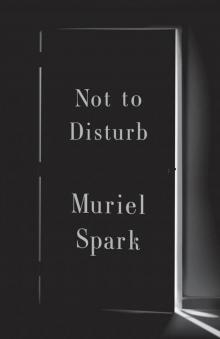 Not to Disturb
Not to Disturb The Prime of Miss Jean Brodie
The Prime of Miss Jean Brodie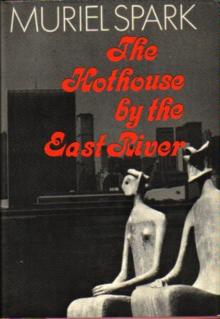 The Hothouse by the East River
The Hothouse by the East River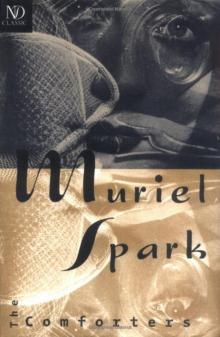 The Comforters
The Comforters (1958) Robinson
(1958) Robinson Unknown
Unknown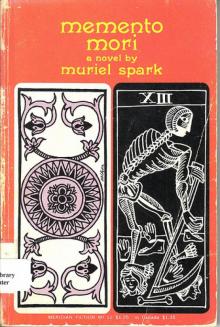 Memento Mori
Memento Mori The Finishing School
The Finishing School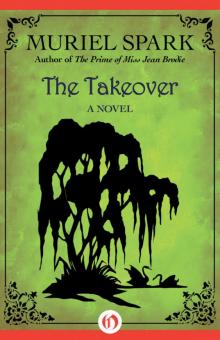 The Takeover
The Takeover Territorial Rights
Territorial Rights The Complete Short Stories
The Complete Short Stories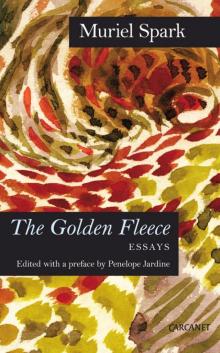 The Golden Fleece: Essays
The Golden Fleece: Essays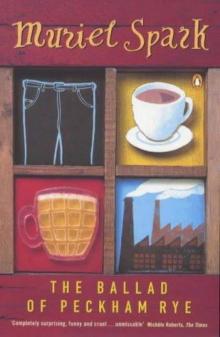 The Ballad of Peckham Rye
The Ballad of Peckham Rye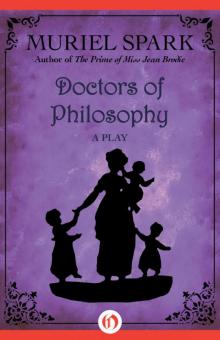 Doctors of Philosophy: A Play
Doctors of Philosophy: A Play The Mandelbaum Gate
The Mandelbaum Gate Loitering With Intent
Loitering With Intent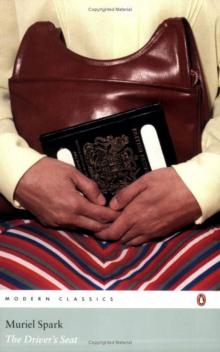 The Driver's Seat
The Driver's Seat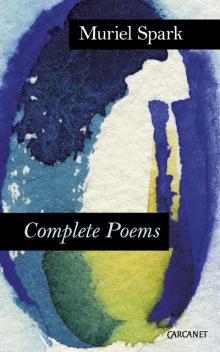 Complete Poems: Muriel Spark
Complete Poems: Muriel Spark Symposium
Symposium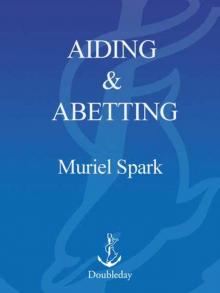 Aiding and Abetting
Aiding and Abetting The Golden Fleece
The Golden Fleece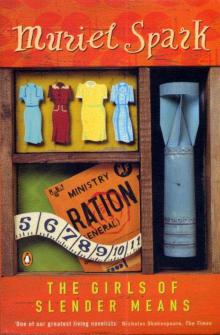 The Girls of Slender Means
The Girls of Slender Means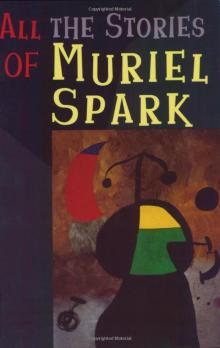 Alice Long’s Dachshunds
Alice Long’s Dachshunds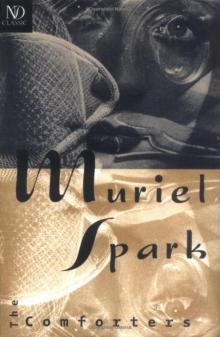 (1954) The Comforters
(1954) The Comforters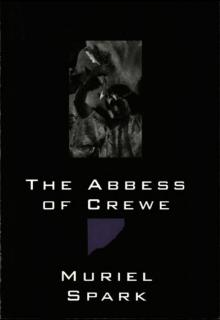 The Abbess of Crewe
The Abbess of Crewe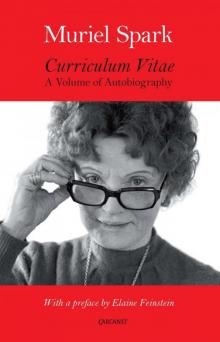 Curriculum Vitae
Curriculum Vitae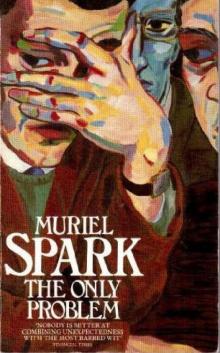 The Only Problem
The Only Problem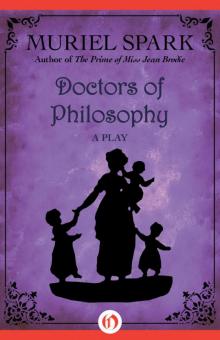 Doctors of Philosophy
Doctors of Philosophy